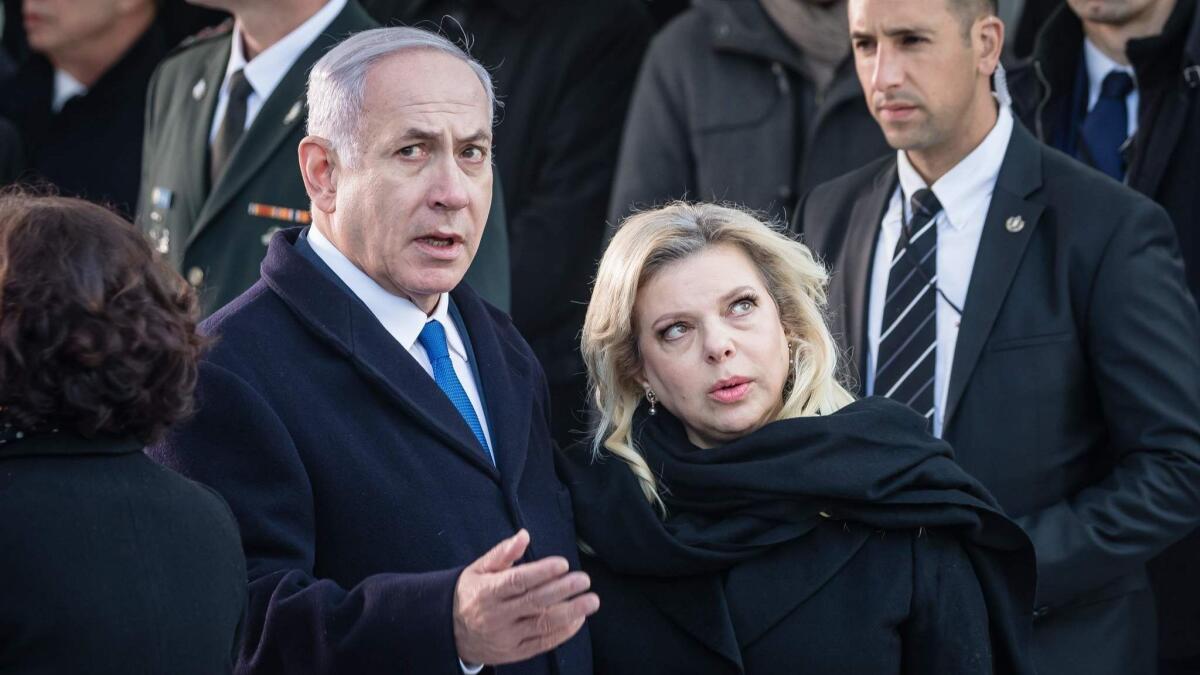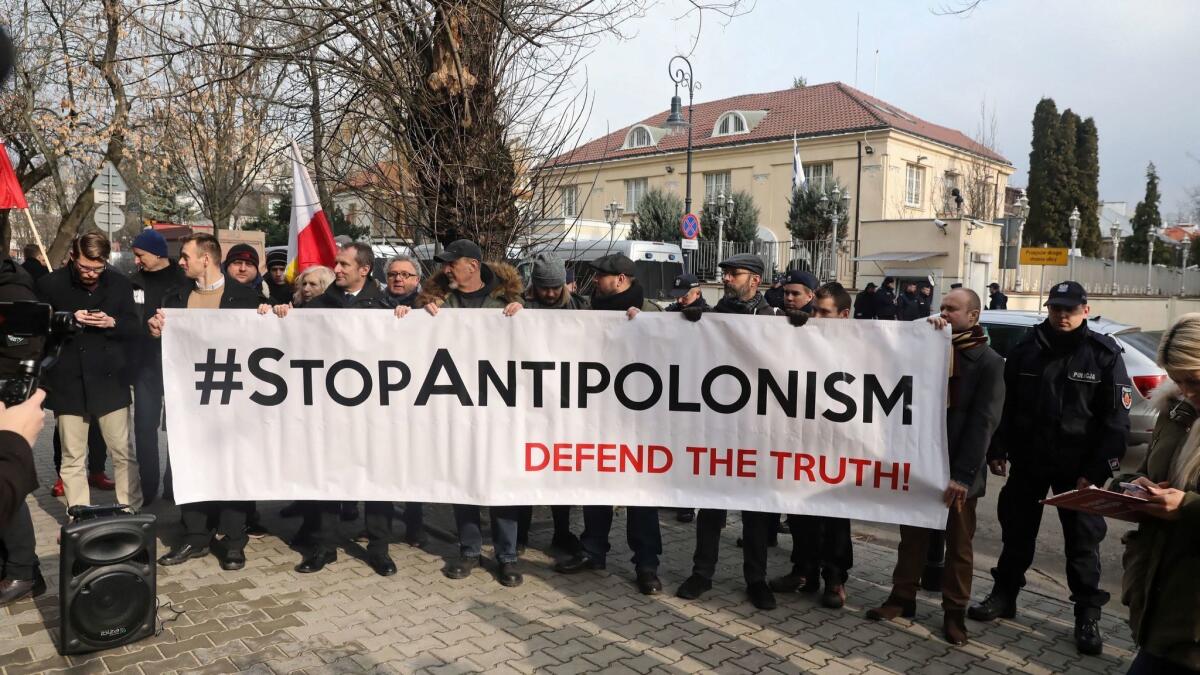Israel’s Netanyahu stirs a hornets’ nest in Poland

- Share via
Reporting from Jerusalem — Israeli Prime Minister Benjamin Netanyahu’s participation in the U.S.-sponsored Middle East conference in Warsaw ended on a discordant note.
Over the course of two days in Poland, the prime minister, who faces a reelection bid in April, was forced several times to retract or rectify statements for which he faced blistering rebuke.
Two posts on official channels that caused widespread alarm were deleted, and following a third Netanyahu statement, which appeared to accuse Poland of collaboration with Nazi Germany, the Polish government threatened to withdraw from a diplomatic summit of right-wing central European nations scheduled to take place next week in Israel.
Although virtually all historians would agree that many Poles did collaborate, Netanyahu’s comments caused an uproar in Warsaw since such allegations were deemed crimes under a recently enacted Polish law.
Speaking in a briefing Thursday, the final day of the conference, Netanyahu was quoted by nearly a dozen Israeli journalists as saying: “The Poles collaborated with the Nazis, and I don’t know anyone who was ever sued for such a statement,” referring to the 2017 law passed by Polish parliament criminalizing any assertion that Poland was complicit in Nazi crimes against humanity during World War II. Roughly 3 million among a prewar population of some 3.58 million Polish Jews were killed in the Holocaust, as well as another 1.8 million non-Jewish Poles.
Reacting on Twitter, Polish Prime Minister Mateusz Morawiecki said that “under German occupation there was no ‘Polish régime’ ” and that “both the Poles and Jews were bestially murdered by the Germans.”
After Polish President Andrzej Duda threatened to relocate the upcoming meeting of Visegrad Group nations — Poland, Hungary, Slovakia and the Czech Republic — from Jerusalem to Poland, Morawiecki announced he was canceling his participation in the summit and would send his foreign minister instead.
Netanyahu refused to clarify matters when he met again with Israeli journalists on Friday, saying only, “You heard me yesterday.”
Also dismissing the matter, an Israeli official told local media, “We understand Poland is heading for elections, too.”
Netanyahu faces reelection in April. On Sunday, pursuant to a court victory by the Israeli Movement for Quality Government, Netanyahu was forced to relinquish his leadership of the foreign ministry. He named Transportation Minister Yisrael Katz to run the ministry, and hours later Katz waded into the controversy, telling an Israeli television reporter that “Polish people collaborated with the Nazis.”
Meanwhile, Yair Lapid, leader of the centrist opposition party Yesh Atid and son of a Holocaust survivor, demanded that “the Israeli government inform the Polish prime minister that he can cancel his flight to Israel and find somewhere else to go. The Holocaust is not up for negotiation. This was true in Netanyahu’s previous surrender and remains true now.”
The remark was a reference to a controversial joint agreement Netanyahu and Morawiecki published in June 2018, rejecting “the actions aimed at blaming Poland or the Polish nation as a whole for the atrocities committed by the Nazis and their collaborators of different nations.”
That attempt to quiet Israeli and Jewish outrage at Poland’s law was widely condemned as a concession to Holocaust revisionism, including by Israel’s Yad Vashem Holocaust memorial.
In an effort to rescue the upcoming Visegrad gathering, which Netanyahu has highlighted in campaign ads as evidence of his international prestige, his office released a statement blaming any misunderstanding on the media.
“In a briefing, Prime Minister Netanyahu spoke of Poles and not the Polish people or the country of Poland. This was misquoted and misrepresented in press reports and was subsequently corrected by the journalist who issued the initial misstatement.”
The declaration was issued only in English, late on Friday as many Israelis sat down for the Sabbath meal.
Krzysztof Szczerski, who heads Duda’s Cabinet, appeared to accept the explanation, tweeting that an article in the Jerusalem Post was “an example of malicious journalistic manipulation.”
It was not immediately clear what journalist Netanyahu’s statement referred to, or why Szczerski spotlighted coverage in the Jerusalem Post.

Earlier, Netanyahu sparked worldwide confusion when he appeared to announce war with Iran.
Speaking in Hebrew, he said the importance of the Warsaw summit, in which he was seen in public with numerous Arab leaders — not a common sight for a leader of Israel, which has been boycotted by most of the Arab world since its inception — was that “representatives of leading Arab countries … are sitting down together with Israel in order to advance the common interest of war with Iran.”
His office blamed any misunderstanding on a poor translation and quickly swapped “war” for “combating” in an English-language tweet. But in Hebrew, Israelis heard their prime minister clearly, if in error, say the word “war.”
Eager to inform the public about statements made by Gulf state leaders in a closed-door session in which ministers spoke with unusual candor, Netanyahu’s office posted a video of the panel to its official YouTube channel only to delete it once journalists reported its existence.
In the video, the foreign ministers of Saudi Arabia and Bahrain, which do not maintain diplomatic ties with Israel, blamed Iran for the lack of a resolution to the Israeli-Palestinian conflict.
Khalid bin Ahmed bin Mohammed Al Khalifa, Bahrain’s foreign minister, termed Iran a “toxic party.”
“If it wasn’t for the toxic party… guns and foot soldiers of the Islamic Republic,” he said, “I think we would have been much closer today in solving this issue with Israel.”
Saudi Arabia’s minister of state for foreign affairs, Adel Jubeir is heard agreeing that Iran plays a “devastating role” throughout the Middle East.
In response to the disclosure, Jubeir maintained that Arab nations attending the Warsaw summit were “unanimous” in viewing Iran as the region’s top destabilizing agent, but reiterated Saudi Arabia’s support for the 2002 Arab Peace Initiative, which Israel has never accepted.
Netanyahu publicly exulted his seating assignment next to the Yemeni foreign minister, posting an image of the two side by side that he captioned: “Making History.”
The “lighthearted moment” was celebrated by Trump’s special envoy, Jason Greenblatt, who related that “Netanyahu’s microphone was not working so foreign minister of Yemen loaned him his microphone. Netanyahu joked about the new cooperation between Israel and Yemen.”
“Step by step ...” Greenblatt concluded, alluding to the yearnings of Israelis to end their status as a pariah state in the Middle East.
The thrill was rapidly extinguished by Yemeni Foreign Minister Khaled Alyemany, who dismissed the incident as an “error of protocol,” which he blamed on Poland in making the seating arrangements.
His presence at the conference was meant only “to confront Iran,” he posted, swatting away any other interpretation as “political solicitation.”
Tarnopolsky is a special correspondent.
More to Read
Sign up for Essential California
The most important California stories and recommendations in your inbox every morning.
You may occasionally receive promotional content from the Los Angeles Times.










